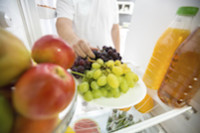Is Fruit Juice Good for You If You Have Diabetes or Prediabetes?
Medically reviewed by Dr Sultan Linjawi, Endocrinologist & Diabetes Specialist — December 2025

Fruit juice is a favourite drink for many people. But is drinking fruit juice bad if you’re diabetic?
How does fruit juice affect me?
Fruit juice, for example orange juice, is high in sugar and is digested rapidly once consumed. Consuming too much fruit juice can cause a rapid increase to your blood glucose levels (also referred to as blood sugar levels), which may lead to hyperglycaemia. If you have diabetes, it is best to avoid drinking large quantities of fruit juice to avoid any rapid changes to blood glucose levels.
To learn more about type 2 diabetes, check out our type 2 diabetes information page.
Carbohydrate content of fruit juice
A small glass or 125mL of fruit juice, contains 15g of carbohydrate or one portion. At home, we have so many different sized cups and glasses, with a standard cup holding approximately 250mL. This means, one 250mL glass of juice contains two carbohydrate portions!! If you’re consuming 2-3 glasses of juice a day, you could be having 4-6 portions of carbohydrates (60-90g of carbohydrates), just from juice alone. This amount of fruit juice could mean you’re easily going over your allowable carbohydrate portions for the day.
If you are already part of our program, we have covered carbohydrate portions in more detail in Week 4. You can learn more about carbohydrate counting and how many grams of carbohydrates you should have a day by watching the videos “What are carbohydrate portions?” and “How much carbohydrate is in the foods I like to eat?”
Consequences of high blood glucose levels
Ongoing high blood glucose levels will result in furthering the risk of developing consequences associated with diabetes. These consequences affect people with type 1 and type 2 diabetes in the same way.
Some consequences of ongoing high blood glucose levels include:
- Kidney disease
- Heart disease
- Eye disease
- Problems with the feet, skin, and teeth and gums
Fruit juice vs whole fruit
When juicing fruit, all of the flesh is removed, leaving the liquid component being the juice. The flesh of fruit also contains fibre. Removing fibre increases the sugar content of juice, effectively concentrating the amount of sugar you are consuming.
A whole piece of fruit provides better nutrition and blood glucose management. Whole fruits are digested more slowly, so your blood glucose levels won’t rise as quickly compared to juice. The fibre content of fruit will also increase the feeling of fullness and contribute to healthy bowel function, as well as reduce the risk of developing other chronic diseases.
While eating a whole piece of fruit is better than drinking fruit juice, people with diabetes should still be mindful of how much fruit they consume in one day.
Why is fibre important?
Consuming a whole piece of fruit, for example an apple, will provide more health benefits than drinking apple juice. One reason for this is because of the fibre content!
As well as being good for your bowels, a diet high in fibre can be beneficial with weight management. It is one of the easiest ways to improve your overall diet.
Fibre is a type of carbohydrate and can be divided into two categories: soluble and insoluble fibre. Soluble fibre is more important for diabetes management (High saturated-fat and low-fibre intake: a comparative analysis of nutrient intake in individuals with and without type 2 diabetes). Soluble fibre partially dissolves in water when it’s in the digestive tract, slowing the rate at which food is absorbed into the blood stream. This can cause blood glucose levels to rise more gradually and reduce the demand for insulin. Insoluble fibre does not dissolve in water and instead passes through the digestive tract. It’s important as it helps to provide bulk to our stools which can help to avoid constipation.
Examples of high fibre foods include:
- Soluble fibre: apples, oats, bran, prunes, and legumes
- Insoluble fibre: wholegrain breads, cereals, and pasta, cabbage, and carrots
A simple way you can incorporate fibre into your everyday, is by swapping white bread for whole meal bread and having a piece of fruit like an apple!
What should I drink instead of fruit juice?
The best alternative to drinking fruit juice is water. Drinking water has no effect on blood glucose levels, making it the best option for people who have diabetes. Another great benefit of water is it’s free from our taps!
Looking for diabetes and diet videos?
Check out our latest diabetes videos for more great content.
If you would like to learn more about diabetes and what foods you should eat to help best manage your condition, join our personalised 12-week diabetes program. The program is full of useful information to help you, and the first week is free!
Please see the following articles for more information:
- Signs and symptoms of diabetes
- Exercise snacking – An easy way to lose weight and exercise
- Yo-Yo Dieting – More serious than just gaining weight!
- Diabetes and diet in pregnancy
- The “Diabetic Diet”: When did it begin and how has it changed?
- Should I follow a low carb diet if I have diabetes?
- Low sugar high carb cereals compared



